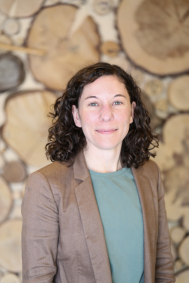Audrey Maheu
PhD in Water Sciences, 2016
Research professor at Université du Québec en Outaouais
Department of Natural Sciences
“It's essential not to shy away from exploring new horizons. Sometimes our focus on completing our thesis can conceal an equally important question: what do we really want to get out of this experience?”
Ph.D. holder in water sciences (2016) from the Institut national de la recherche scientifique (INRS) under the supervision of André St-Hilaire, Audrey Maheu currently holds the position of professor-researcher at the Université du Québec en Outaouais and is also scientific director of the Institut des Sciences de la Forêt tempérée (ISFORT). Her field of expertise revolves around ecohydrology, an interdisciplinary field that investigates the relationships between water and ecosystems, whether aquatic or terrestrial.
Audrey Maheu has built up a solid academic background, beginning with a B.Sc. in geomatics applied to the environment from the Université de Sherbrooke, followed by a professional master's degree in integrated water resources management from McGill University. She then gained valuable experience working as an intern for a year at the International Development Research Centre (IDRC), before embarking on a PhD in water sciences at the Centre Eau Terre Environnement. Although she admits to having initially had little interest in research at the start of her career, this all changed when she completed a research internship in Dakar, Senegal, where she was mapping floods. It was then that research really began to fascinate her. Later, she joined Environment Canada, but anticipating budget cuts, she seized the opportunity to undertake her PhD at INRS, mainly attracted by the work of Professor André St-Hilaire. She explains: "I had become aware of some of André's work on water quality when I was at Environment Canada. His approach really appealed to me, which reinforced my desire to do my doctorate under his supervision. What's more, André was very open to supervising students with no research experience, and saw no problem with that. His open-mindedness is one of his distinctive qualities. Atypical backgrounds are no obstacle for him. His attachment to university research was solidified during her studies at INRS. "It's a perfect field for me. I really feel like a fish in water," she says with amusement. Audrey also finds that she prefers to devote herself to basic science and the study of hydrological and ecological processes. “Asking questions, exploring new ideas and looking for answers - that's what I'm passionate about.”
Since joining the Université du Québec en Outaouais in 2017 as a professor-researcher, Audrey Maheu has already supervised numerous students and published several articles in leading journals in her field. She has rapidly established herself as a reference in the field of water. Her peers emphasize her commitment, which goes far beyond research. She was instrumental in introducing the international Project WET (Water Education for Teachers) program in Québec, for which she received an award from the Canadian Water Resources Association. Ecohydrology has undergone a notable evolution in recent years, moving from a primary focus on forests and trees to a broader study of aquatic environments, wetlands and hydrology. Its expertise lies in understanding the complex interactions between ecosystems and water.
“It's possible to devote your entire thesis to a single subject, and then explore many other areas later on,” explains Audrey. “Sometimes, the evolution of our career leads us to tackle a multitude of different subjects. It's essential not to limit ourselves to our doctoral field. For example, I had envisaged a career in river hydrology, but ended up working in forest hydrology. Had I been asked before, I would never have imagined working in this field. Our career paths evolve and are not determined by our initial field of study. When I reflect on my career path, I realize that today I'm able to tackle a multitude of other fields.”
Audrey credits INRS and André St-Hilaire's laboratory with opening the doors to environmental hydrology. This discipline has enabled her to address fundamental ecological issues. “What particularly sets his laboratory apart is the ability to examine crucial environmental issues head-on. This is what I appreciated most, in addition to building a network of contacts that will continue to accompany me throughout my career. These elements represent considerable assets for me.”
At the end of our interview, she shares this inspiring message: “It's essential not to shy away from exploring new horizons. Sometimes, our focus on completing our thesis can conceal an equally important question: what do we really want to get out of this experience?” Audrey's ambition is a fulfilling and lasting academic career dedicated to research. We sincerely wish her a long and fruitful career, marked by new scientific discoveries.
[Interview taken in October 2023].

